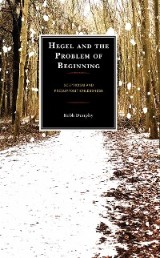Details

Hegel and the Problem of Beginning
Scepticism and Presuppositionlessness|
44,99 € |
|
| Verlag: | Rowman & Littlefield Publishers |
| Format: | |
| Veröffentl.: | 17.01.2023 |
| ISBN/EAN: | 9781538147566 |
| Sprache: | englisch |
| Anzahl Seiten: | 192 |
DRM-geschütztes eBook, Sie benötigen z.B. Adobe Digital Editions und eine Adobe ID zum Lesen.
Beschreibungen
<p><span>Hegel opens the first book of his Science of Logic with the statement of a problem: “The beginning of philosophy must be either something mediated or something immediate, and it is easy to show that it can be neither the one nor the other, so either way of beginning finds its rebuttal.” Despite its significant placement, exactly what Hegel means in his expression of this problem and exactly what his solution to it is, remain unclear.</span></p>
<p><span>In this book, Robb Dunphy provides a detailed engagement with Hegel’s “problem of beginning”, locating it within Hegel’s account of significant approaches to the topic of beginning in the history of Western philosophy, as well as making an extended case for the influence of Pyrrhonian Scepticism on the beginning of Hegel’s </span><span>Logic</span><span>. Dunphy’s discussion of the various putative solutions that Hegel might be thought to put forward contributes to debates concerning Hegel’s views on the methodology of logic, the relation between his </span><span>Logic</span><span> and his </span><span>Phenomenology of Spirit</span><span>, and differences between his </span><span>Encyclopaedia</span><span> presentation of logic and that of his greater </span><span>Science of Logic</span><span>.</span></p>
<p><span>Hegel and the Problem of Beginning</span><span> also functions as a critical commentary on Hegel’s essay, “With what must the beginning of the science be made?” which should be of interest to both researchers and students working on the opening of Hegel’s </span><span>Logic</span><span>.</span></p>
<p></p>
<p><span>In this book, Robb Dunphy provides a detailed engagement with Hegel’s “problem of beginning”, locating it within Hegel’s account of significant approaches to the topic of beginning in the history of Western philosophy, as well as making an extended case for the influence of Pyrrhonian Scepticism on the beginning of Hegel’s </span><span>Logic</span><span>. Dunphy’s discussion of the various putative solutions that Hegel might be thought to put forward contributes to debates concerning Hegel’s views on the methodology of logic, the relation between his </span><span>Logic</span><span> and his </span><span>Phenomenology of Spirit</span><span>, and differences between his </span><span>Encyclopaedia</span><span> presentation of logic and that of his greater </span><span>Science of Logic</span><span>.</span></p>
<p><span>Hegel and the Problem of Beginning</span><span> also functions as a critical commentary on Hegel’s essay, “With what must the beginning of the science be made?” which should be of interest to both researchers and students working on the opening of Hegel’s </span><span>Logic</span><span>.</span></p>
<p></p>
<p><span>This book provides a critical commentary on Hegel’s introductory essay to the first book of his </span><span>magnum opus</span><span>, the </span><span>Science of Logic</span><span>. Robb Dunphy makes an extended case for the importance of the influence of Pyrrhonian Scepticism on the beginning of Hegel’s </span><span>Logic</span><span> and provides a novel interpretation of the “problem of beginning”.</span></p>
<p><span>Acknowledgements</span></p>
<p><span>Abbreviations</span></p>
<p><span>Introduction: With What Must the Beginning of the Science be Made?</span></p>
<p><span>0.0 Introduction</span></p>
<p><span>0.1 Hegel’s Logic and its Beginning</span></p>
<p><span>0.2 Hegel and Pyrrhonian Scepticism</span></p>
<p><span>0.3 A Brief Précis of “With what must the beginning of the science be made?”</span></p>
<p><span>0.4 Conclusion</span></p>
<p><span>Chapter 1: Hegel and Pyrrhonian Scepticism</span></p>
<p><span>1.0 Introduction</span></p>
<p><span>1.1 Sextus’ Account of Pyrrhonism</span></p>
<p><span>1.2 Hegel and Pyrrhonism</span></p>
<p><span>1.3 Conclusion</span></p>
<p><span>Chapter 2: A Short History of the Problem of Beginning</span></p>
<p><span>2.0 Introduction</span></p>
<p><span>2.1 The Objective and the Subjective Beginning</span></p>
<p><span>2.2 The Methodological Beginning</span></p>
<p><span>2.3 The Modern Problem of Beginning</span></p>
<p><span>2.4 Hegel on First Principles and the Beginning</span></p>
<p><span>2.5 Conclusion</span></p>
<p><span>Chapter 3: The Problem of Beginning</span></p>
<p><span>3.0 Introduction</span></p>
<p><span>3.1 The Problem of Beginning: Preliminary Investigation</span></p>
<p><span>3.2 The Problem of Beginning as an Agrippan Problem</span></p>
<p><span>3.3 The Solution to the Problem of Beginning</span></p>
<p><span>3.4 Alternatives Criticised, Objections Anticipated</span></p>
<p><span>3.5 Conclusion</span></p>
<p><span>Chapter 4: Mediation I: Phenomenology</span></p>
<p><span>4.0 Introduction</span></p>
<p><span>4.1 The Phenomenology and the Beginning of the Logic</span></p>
<p><span>4.2 Some Problems</span></p>
<p><span>4.3 Conclusion</span></p>
<p><span>Chapter 5: Mediation II: Completed Scepticism</span></p>
<p><span>5.0 Introduction</span></p>
<p><span>5.1 A Third Solution?</span></p>
<p><span>5.2 Completed Scepticism</span></p>
<p><span>5.3 Conclusion</span></p>
<p><span>Bibliography</span></p>
<p><span>Index</span></p>
<p></p>
<p></p>
<p><span>Abbreviations</span></p>
<p><span>Introduction: With What Must the Beginning of the Science be Made?</span></p>
<p><span>0.0 Introduction</span></p>
<p><span>0.1 Hegel’s Logic and its Beginning</span></p>
<p><span>0.2 Hegel and Pyrrhonian Scepticism</span></p>
<p><span>0.3 A Brief Précis of “With what must the beginning of the science be made?”</span></p>
<p><span>0.4 Conclusion</span></p>
<p><span>Chapter 1: Hegel and Pyrrhonian Scepticism</span></p>
<p><span>1.0 Introduction</span></p>
<p><span>1.1 Sextus’ Account of Pyrrhonism</span></p>
<p><span>1.2 Hegel and Pyrrhonism</span></p>
<p><span>1.3 Conclusion</span></p>
<p><span>Chapter 2: A Short History of the Problem of Beginning</span></p>
<p><span>2.0 Introduction</span></p>
<p><span>2.1 The Objective and the Subjective Beginning</span></p>
<p><span>2.2 The Methodological Beginning</span></p>
<p><span>2.3 The Modern Problem of Beginning</span></p>
<p><span>2.4 Hegel on First Principles and the Beginning</span></p>
<p><span>2.5 Conclusion</span></p>
<p><span>Chapter 3: The Problem of Beginning</span></p>
<p><span>3.0 Introduction</span></p>
<p><span>3.1 The Problem of Beginning: Preliminary Investigation</span></p>
<p><span>3.2 The Problem of Beginning as an Agrippan Problem</span></p>
<p><span>3.3 The Solution to the Problem of Beginning</span></p>
<p><span>3.4 Alternatives Criticised, Objections Anticipated</span></p>
<p><span>3.5 Conclusion</span></p>
<p><span>Chapter 4: Mediation I: Phenomenology</span></p>
<p><span>4.0 Introduction</span></p>
<p><span>4.1 The Phenomenology and the Beginning of the Logic</span></p>
<p><span>4.2 Some Problems</span></p>
<p><span>4.3 Conclusion</span></p>
<p><span>Chapter 5: Mediation II: Completed Scepticism</span></p>
<p><span>5.0 Introduction</span></p>
<p><span>5.1 A Third Solution?</span></p>
<p><span>5.2 Completed Scepticism</span></p>
<p><span>5.3 Conclusion</span></p>
<p><span>Bibliography</span></p>
<p><span>Index</span></p>
<p></p>
<p></p>
<p><span>Robb Dunphy</span><span> is an Alexander von Humboldt Postdoctoral Research Fellow at the Albert-Ludwigs-University Freiburg. He has previously held research fellowships at the Goethe University Frankfurt, University College Dublin, and the University of Hamburg, and has taught philosophy at Northeastern University London, the University of Winchester, and the University of Sussex. His primary research interests are in the theoretical philosophy of Kant and the German Idealists and in the history of scepticism. He is the co-editor of </span><span>Metaphysics as a Science in Classical German Philosophy</span><span> and has published research articles in journals including </span><span>Apeiron</span><span>, </span><span>The Review of Metaphysics</span><span>, the </span><span>Hegel Bulletin</span><span>, and </span><span>Logos and Episteme</span><span>.</span></p>


















